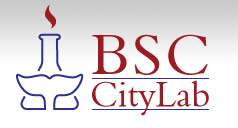 |
||||
|
||||
 |
||
| Home > About BSU CityLab > Purpose and History > Brief History | ||
Brief History of BSU CityLab |
||
|
BSU CityLab was established in 1996 as a satellite of the Boston University School of Medicine's (BUSM) CityLab program. The original CityLab piloted a very successful model, beginning in 199?, for which the demand rapidly increased. Classroom teachers from all around the state wanted their students to be able to participate, yet the BUSM CityLab schedule was quickly filled each new school year. Meanwhile, Bridgewater State University was rising in prominence among higher education circles as a technologically advanced campus. Far-sighted administrators obtained funding in the 1990s to build the necessary infrastructure for distance learning and science outreach programs, including the John J. Moakley Center for Technology in which BSU CityLab is housed. The College already had many things going for it, making it an ideal location for a satellite CityLab program. Founded in 1840, Bridgewater State University is a regional, comprehensive, public college centrally located in southeastern Massachusetts. It enrolls approximately 10,000 students, most of them undergraduates, 80% of whom come from the region. BSC prepares more teachers than any other institution in New England and also offers many workshops and graduate credit courses for the teachers' continuing professional development. In addition to teacher preparation, one of the mandates from the Commonwealth is to prepare students for careers in the local economy, an economy in which the biomedical, biotechnology, and the computer industries play a central role. Moreover, the BSU campus was founded on the belief that the very forces that have brought about current social, economic, and educational gaps, particularly within urban and geographically underserved school settings, may also present opportunities for building sustainable cross-community and multidisciplinary efforts to narrow historic inequities in science education. Thus, the founders of BSU CityLab hoped to bridge the gap between under-equipped science teachers and students in area school districts and the state-of-the-art laboratory facilities and curriculum at Bridgewater State University. Many people, including local educators, pooled their time and talent to bring CityLab modules and pedagogy to Bridgewater. Among the original spearheads, notables include retired teachers Dr. John Kelley of the Brockton Public Schools and Dr. Dave Chuckran of the Bridgewater-Raynham Public Schools. Other administrators and science teachers from both districts lent their support. The collaboration was made possible by the combined efforts of Dr. Don DeRosa, Dr. Carl Franzbleau, xxx, and other dedicated staff at BUSM CityLab. BSU Biology Professor Dr. John Jahoda was instrumental in obtaining the first Science Education Partnership Award (SEPA) from the National Institutes of Health (NIH). Dr. Jeff Bowen of the BSU Biology faculty served as director for three years and was a significant creative force behind the development of educational modules at BSU CityLab. BSU CityLab Today Funding for the establishment of BSU CityLab and development of curriculum modules has been provided, in large part, by a Science Education Partnership Award (SEPA) from the National Institutes of Health (NIH). A three-year Phase I SEPA grant was awarded in 2000. The project, entitled BSC CityLab Satellite: Biotech for Students and Teachers Phase I (RR15600, 2000-2004), was funded through a fourth year with a twelve-month no-cost extension. When funding ended, BSU CityLab continued to offer its science outreach programs for students and teachers, relying for financing on established partnerships with local school district. Building upon the success of the Phase I grant, BSU CityLab was awarded Phase II funding in 2005 (name of project?) to expand the partnerships and disseminate the curriculum modules developed in Phase I. An additional no-cost extension will enable the printing and distribution of the curriculum modules, along with an extensive redevelopment of the website, both of which are scheduled to be completed by the end of August 2008. Center for the Advancement of Science Exploration (CASE).
|
 |
|


